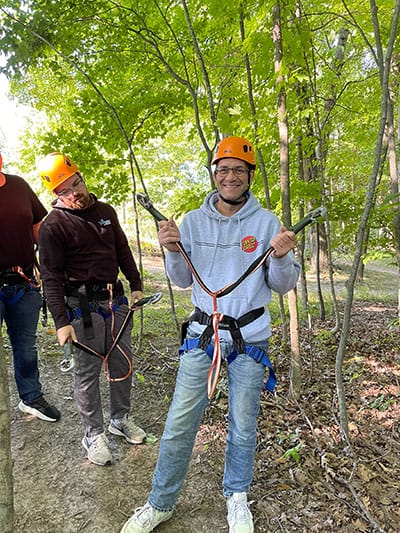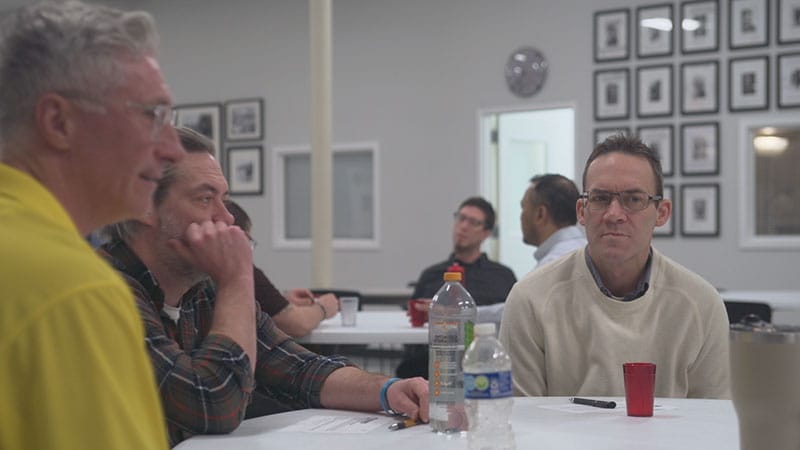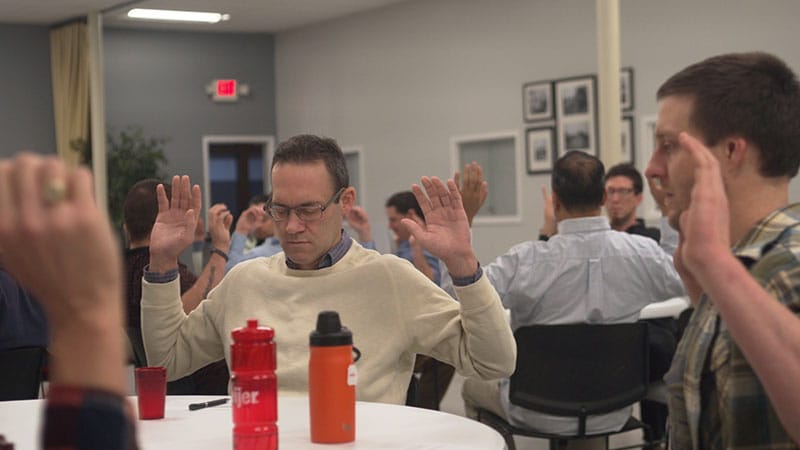
When Aaron was finally able to speak, the doctors at the hospital told him they were shocked he was alive — not because of the wreck that totaled his car and fractured six ribs, but because of the amount of alcohol in his body.
His blood alcohol content was more than five times the legal limit, “which is super drunk, insanely drunk,” Aaron said. “The doctors were saying, ‘We’re amazed that you’re not dead or that you haven’t had organ failure, considering how drunk you are. You must have been drinking for a very long time.’”
In fact, he had been. Estranged from his parents, he was living in his car in a hotel parking lot, stealing food and alcohol, barely surviving. Now the police officer who had pulled him from a car crashed into trees was standing in the hospital doorway, waiting to take him to jail.
That might have been the end of Aaron’s story, if not for a persistent brother and the new way of living he found at Guiding Light.
“I guess they call it Guiding Light for a reason. It’s a guide. It’s a way. And they walk that path with you, hand in hand. They make sure they do whatever they can possibly do without physically pushing you forward. But you have to be willing. They teach you willingness.”

Aaron wasn’t always so willing. He was sitting in jail for more than a week, stubbornly refusing to contact his family, when his brother’s desperate search finally paid off. After a couple of phone calls, Aaron finally agreed he needed help. “He said, ‘OK, I’m glad you’re admitting it. I will do whatever it takes to get you out of there. But you have to promise me that when I come get you, the first place you’re going is a place called Guiding Light.’” Aaron agreed — but it wasn’t easy. First came the isolation and reflection of the probation room. Then came the classes, routines, expectations, discipline and accountability of entering the treatment program.
“My self-esteem was nothing. I had lost a bunch of weight. I was weak. I didn’t know anyone. I wasn’t punctual. I couldn’t keep a schedule to save my life. I got written up probably five or six times in the first week and a half. I thought for sure I was gone. But these people stuck with me.” Because Guiding Light stuck with him, and Aaron stuck with the program, he started noticing a change. A lot of change. “I became able to recognize self-compassion and I’m learning how to apply it to my life and the trouble I was going through. I’m becoming more vulnerable, taking risks and realizing it’s OK to fail. I’m 44 now and physically I’m in the best shape I’ve been in since my early 30s. My spiritual formation has grown just incredibly.” He deeply appreciates the fellowship of the Guiding Light community, who tell him how much they love to see the “real Aaron” come out. ”I’m getting compliments almost on a daily basis from my peers, from the staff here. They don’t recognize me anymore. And I thank them every day for their patience with me, and patience for me to have patience in myself, to give myself the time. I haven’t felt this good in a very long time.”
When Aaron first arrived at Guiding Light, he was still harboring resentments and he thought he would never reconcile with his parents. But he has learned that reconnecting with family requires him to reconnect with himself first. “I’m ready to fix that. Now it’s time to heal and it’s time to make amends.” Though he has always been close to the brother who brought him to Guiding Light, that connection has grown even stronger.
“We weren’t allowed to use the phone for the first 30 days. So, when I first was able to call him, I was telling him that he saved my life, and he just kept telling me, ‘you don’t have to thank me,’ and of course we both started crying.” Aaron is looking forward to moving to the next phase of recovery, Achieve, so he can start looking for work. He plans to eventually continue rebuilding his life at Guiding Light’s sober living community, Iron House. He knows every stage of his recovery is because the 100% donor-funded program makes a long-term commitment possible.
“At Guiding Light, you don’t just come here to sober up and then have them say, ‘OK, have fun, good luck.’ They really want you to succeed, they’re with you the whole time. They prep you mentally and physically and spiritually. They help you with a job. They allow you to save money, and then they help you graduate to a safe place to live, a sober living house.
“At every level of this place, it’s open arms and open hearts.”




